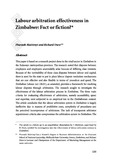Please use this identifier to cite or link to this item:
https://cris.library.msu.ac.zw//handle/11408/1247Full metadata record
| DC Field | Value | Language |
|---|---|---|
| dc.contributor.author | Maitireyi, Pharaoh | - |
| dc.contributor.author | Duve, Richard | - |
| dc.date.accessioned | 2016-05-06T16:34:10Z | - |
| dc.date.available | 2016-05-06T16:34:10Z | - |
| dc.date.issued | 2011 | - |
| dc.identifier.issn | 1562-6997 | - |
| dc.identifier.uri | http://accord.org.za/wp-content/uploads/2011/11/ajcr_2011_3.pdf | - |
| dc.description.abstract | This paper is based on a research project done in the retail sector in Zimbabwe in the Bulawayo metropolitan province. The research noted that disputes between employees and employers unavoidably arise because of differing class interests. Because of the inevitability of these class disputes between labour and capital, there is need for the state to put in place labour dispute resolution mechanisms that are cost effective and also flexible in terms of procedure and speed. The Zimbabwe Labour Act (28.01), as amended, provides a framework for resolving labour disputes through arbitration. The research sought to investigate the effectiveness of the labour arbitration process in Zimbabwe. The three main criteria for evaluating effectiveness of arbitration, namely accessibility, speed and expertise, were subjected to an empirical test in the Zimbabwean context. The article concludes that the labour arbitration system in Zimbabwe is largely ineffective due to reasons of prohibitive costs, complexity of procedures and the perceived incompetence of arbitrators. The lack of transparent arbitrator appointment criteria also compromises the arbitration system in Zimbabwe. The research further revealed that, though arbitration can serve a very good purpose as an alternative to costly and lengthy litigation, its effectiveness relies to a great extent on its flexibility and transparency as well as the qualifications, expertise and integrity of the people who preside over it. | en_US |
| dc.language.iso | en | en_US |
| dc.publisher | ACCORD | en_US |
| dc.relation.ispartofseries | African Journal on Conflict Resolution;Vol. 11, No. 3; p. 135-157 | - |
| dc.subject | Labour arbitration, Zimbabwe | en_US |
| dc.title | Labour arbitration effectiveness in Zimbabwe: fact or fiction? | en_US |
| dc.type | Article | en_US |
| item.openairetype | Article | - |
| item.openairecristype | http://purl.org/coar/resource_type/c_18cf | - |
| item.languageiso639-1 | en | - |
| item.fulltext | With Fulltext | - |
| item.grantfulltext | open | - |
| item.cerifentitytype | Publications | - |
| Appears in Collections: | Research Papers | |
Files in This Item:
| File | Description | Size | Format | |
|---|---|---|---|---|
| ajcr_2011_3 abstract.pdf | 275.49 kB | Adobe PDF |  View/Open |
Page view(s)
162
checked on Feb 5, 2026
Download(s)
52
checked on Feb 5, 2026
Google ScholarTM
Check
Items in MSUIR are protected by copyright, with all rights reserved, unless otherwise indicated.



